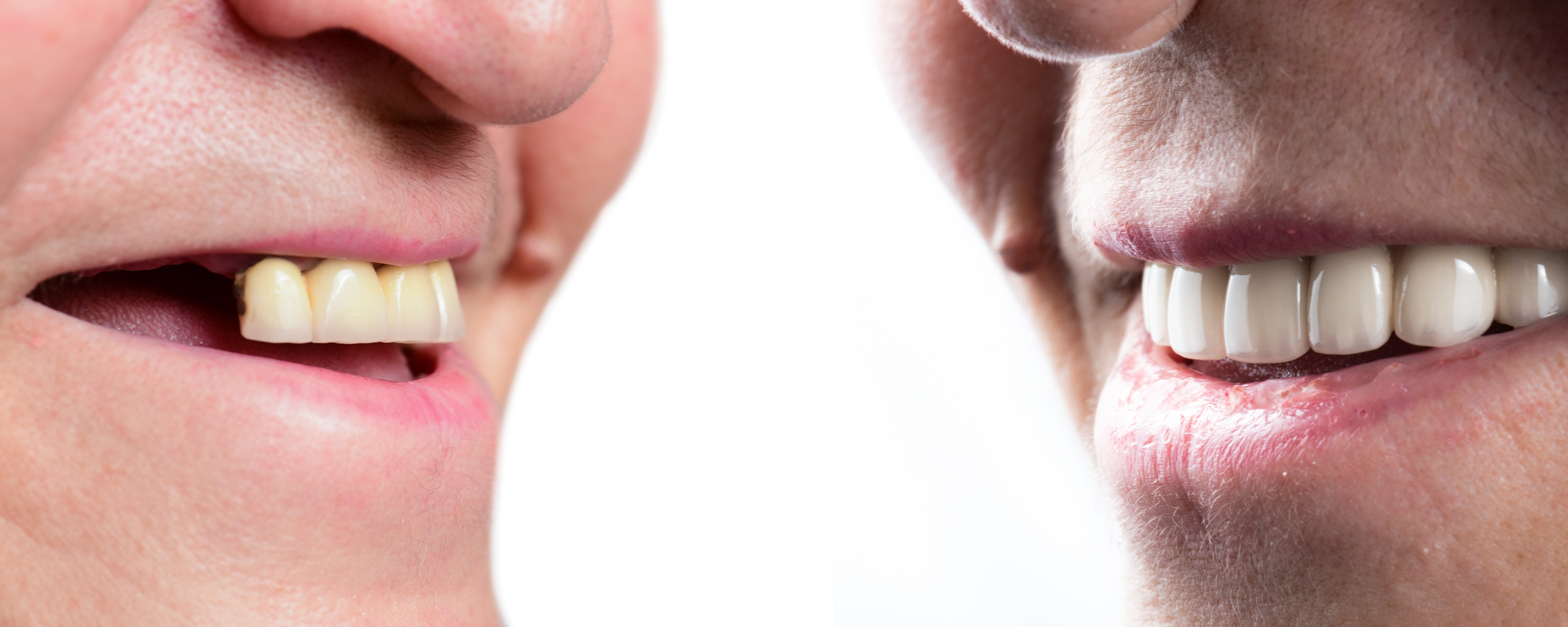Dentures vs. Dental Implants

If you have lost one or more teeth, you aren’t alone. Tooth loss is more common that you might think. There are a lot of reasons why someone may lose a tooth – from severe decay or gum disease to a trauma affecting the mouth. Nevertheless, the result is the same, with most people finding that they change the way that they smile, talk and even eat to get around the problem of missing teeth. Unsurprisingly, gaps in your smile can also have a significant psychological impact too, with lots of people becoming self-conscious or even embarrassed about the way that their teeth now look.
The good news is that it isn’t necessary to live with missing teeth and poor dental function anymore. There’s a range of solutions for replacing lost teeth, meaning that there is something suitable for every patient. Two of the most popular options for multiple missing teeth are dentures and dental implants. However, many people struggle to know which is right for them. Here’s what you need to know about dentures vs dental implants to help you make an informed decision.
Dentures: an overview
Traditional dentures have something of a poor reputation, but the truth is that modern dentures are far superior to their earlier counterparts. Dentures are essentially a series of artificial teeth that are attached to a mold that is placed over the gums and secured with adhesive. They are worn all day long, replacing the function of the missing teeth, and then removed overnight so that they can be cleaned, which keeps your mouth healthy.
Dentures can be provided as full or partial arches, and if you require a denture for the upper jaw, your device will also have a plate that covers the roof of your mouth. This gives your denture greater stability so that it doesn’t slip, move around and fall out. Meanwhile, dentures for the lower jaw are created in a horseshoe shape so that they don’t interfere with your tongue. Every denture is custom created for the individual size, shape and appearance of the patient’s mouth.
What are the benefits of choosing dentures?
There a number of benefits when you choose dentures to replace your missing teeth.
Your artificial teeth are completely removable
No invasive surgery is needed to create your denture
Dentures are suitable for virtually all patients including those with weakened/deteriorated bone in their jaw (which is common in patients with tooth loss)
Dentures aren’t without compromise though. Some patients find them uncomfortable to wear, they aren’t as secure as alternative options and they can be fiddly to clean and take care of.
Dental implants: an overview
Dental implants are one of the newest and most innovative solutions for missing teeth. They are artificial teeth that have a fake root. This root, made from biocompatible titanium, is surgically implanted into the jawbone where the bone heals around it, anchoring it permanently to the jaw structure. This process takes several months but gives implants the unrivalled stability and durability for which they are renowned. Once this has happened, bespoke artificial teeth are milled and attached to the post, completing the restoration and providing a new smile that looks, feels and acts just like regular teeth.
Dental implants can be used to replace single or multiple missing teeth. One implant post is needed for single implants that replace just one tooth. An implant-supported bridge can usually be secured on 2 implant posts, while a denture can take anywhere between 6 and 8.
Benefits of dental implants:
There are a huge range of benefits associated with dental implants, not limited to:
Unrivalled stability and security of your restoration
The most natural in appearance compared to alternatives
Implants reinforce the bone in your jaw to keep it healthy
No embarrassing slips and movements
No need to worry about what you eat since the implants cannot be pulled out
Permanence
Easier to clean and take care of than dentures
A long-lasting solution that could be maintained for upwards of 20 years
Greater patient comfort than dentures
Higher overall satisfaction for the majority of patients
There are virtually no notable downsides associated with the use of dental implants, although it is more expensive and does necessitate a recovery period while the implant posts heal into place.
If you would like to find out more about the compelling benefits of dental implants, don’t hesitate to get in touch with our friendly and knowledgeable team at Elite Dentistry and Implant Center by calling (205) 224-0040.








